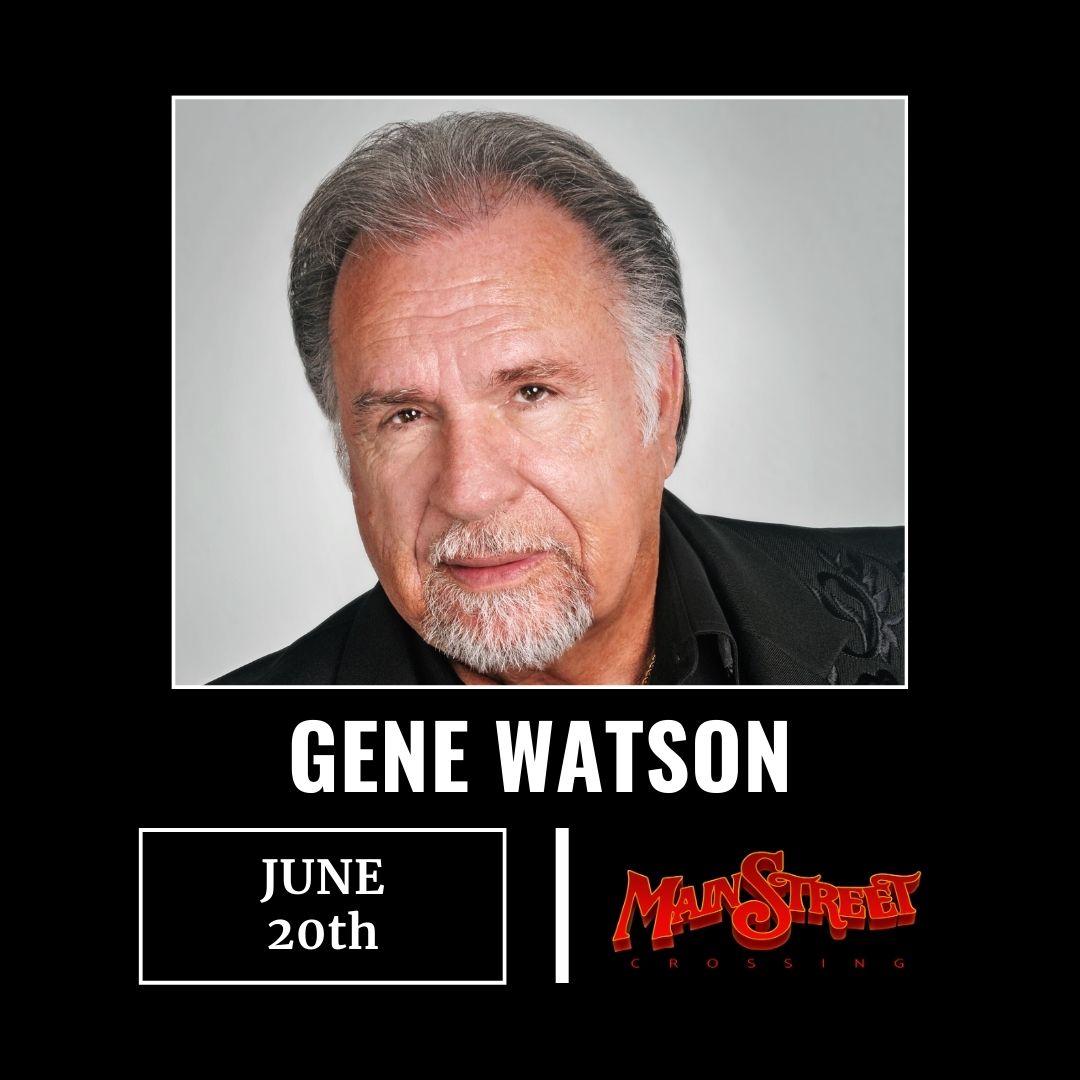
Gene Watson
June 20, 2025
Doors 6:00 / Show 8:00
We are so excited to welcome Gene Watson to Tomball, Texas to perform on the Main Street Crossing stage. What an honor it is to host you for a live concert with an artist up-close. Buy your tickets and read a little more about Gene Watson below.
If you ask any number of country singers who their favorite singer is, a large number of them will respond: Gene Watson. His music peers even named him “The Singer’s Singer” for his octave jumping range and smooth tone. Gene Watson has 34 studio albums, scored over 72 charted songs, including 23 Top Tens and 6 #1 hits over his Sixty-year career. Watson’s first single, the self- penned, “If It’s That Easy” was released on Sun Valley Records in 1962.
It is safe to say that most knowledgeable country fans would point to Gene Watson as one of country music’s best ballad singers in the same league as country icons George Jones, Merle Haggard, Ray Price and others who are the standard bearers for honest, traditional country music. It’s no surprise to anyone but Gene that the Grand Ole Opry asked him to be a member and inducted him into that iconic group in March of 2020, just before the world shut down for the pandemic.
It’s also no surprise that such artists as Vince Gill, Lee Ann Womack, Trace Adkins, Connie Smith, Joe Nichols, Alison Krauss, and many others are not only happy, but eager to record with Gene. It’s a stunning truth that at nearly 78 years of age, that Gene still sings with his clear, pure tone intact, an unmatched soulful delivery and in the same key as 30 years ago. And that is good news for fans of real country music rooted in the timeless values of one of America’s bedrock musical genres.
“I think I’m working harder on each album to perfect what I do and still always working to be better,” Gene notes. “I don’t want anything to be so technically slick that we lose the emotion or the electricity of the moment. Each song is very personal to me and I always want the people listening to feel the emotion. Each song has a special meaning to me or I wouldn’t record it.”
Indeed Gene records the old-school way, live in the studio with a set of great musicians, and often singing literally in the same room as the musicians, eschewing the isolation booths normally used by vocalists. Gene picks all the songs for his albums and works side by side with his longtime producer, Dirk Johnson.
“I feel very fortunate,” Gene says, “that when I start to make an album I can call on the brilliant Nashville songwriting community and most of the songwriters there know my style and what type of songs to pitch to me. That makes my job easier. I try to choose songs I feel all people can relate to while at the same time trying to find a song that’s a little bit different and unique.”
Gene’s life story is a classic country life scenario. He is truly a humble man of the soil who has no idea of his own greatness. When he sings at the Grand Ole Opry, other artists gather at the side of the stage to watch him. But Gene himself seems incapable of pride or self-congratulation. Indeed despite all his success he has never totally abandoned his auto repair business.
“I can remember singing before I can remember talking,” he relates. “Even when I was a kid, if I heard a song twice, I knew it. But I never planned to be an entertainer. I knew I could sing, but that wasn’t out of the ordinary. My whole family could.” In fact, Watson doesn’t even think he was the best singer in the seven-child household. Make that “bus-hold”. The itinerant Watson family moved from shack to shack until his father customized an old school bus for living quarters and transportation from job to job.
“Yeah, we were poor,” says the singer. “Today, people live in motor homes. Ours was yellow. We traveled to Arkansas, Oklahoma, and Texas until one day my dad came in and decided we were going to Phoenix, Arizona. We didn’t have the money to go to Phoenix, so we worked our way out there, stopped to pick crops and all that stuff. My dad was kind of a gypsy. He always said, ‘I’m fixin’ to leave in the morning. If there’s a dollar out there, I’m going to get 50 cents of it.’ I always kept that in mind. My dad worked hard at whatever it took to put food on the table. He worked in the log woods. He worked at the tire shops. He was a crop worker. We would cut spinach. We would pull radishes. We would dig potatoes. We would pick cotton. Whatever it took, we did it. That’s the only life I knew. I was a poor boy. But I wouldn’t take nothing for my raising–as far as my teachings, the way my mother raised me, the way my dad worked and everything. We were a happy family. No one else around us had anything more, so we didn’t know we were poor. I think it took all that to get all this.
Born in Palestine, Texas in 1943, Gene Watson was singing in holiness churches with his family at an early age. His father played blues harmonica and guitar alongside African-American field laborers. Watson grew up loving both bluesman Jimmy Reed and honky-tonk king Lefty Frizzell. His earliest public country performance came when he was just 12 years old.
Watson worked from the time he was six, working in the fields, to age 12, when he’d jump off the school bus to work at the local salvage yard. He dropped out of high school to work fulltime. In his late teens, he supported his family by doing auto body repair, so by day he worked on cars, and at night he sang in clubs. “But doing music professionally was never a goal of mine,” he confesses. I always wanted to work on cars. I always say I never did go looking for music. Music found me. Before I ever made a record, The Wilburn Brothers heard me sing down in Houston at a nightclub one night. They said they’d like for me to go with them and do a couple of shows. So I came up to Nashville and traveled to North Carolina with them. They got me on the Grand Ole Opry, and I got a standing ovation and an encore singing the Hank Williams song ‘I Can’t Help It If I’m Still In Love With You’ and ‘It Is No Secret What God Can Do.’ After that, they carried me down to the Ernest Tubb Record Shop and I got on stage and broadcast on The Midnight Jamboree. That was my first experience with the Big Time. I was 21.”
In the mid 70s, while on Capitol Records, he enjoyed success with a string of national hits, “Love In The Hot Afternoon,” “Where Love Begins,” “Paper Rosie,” “Farewell Party,” “Should I Come Home (Or Should I Go Crazy),” and “Nothing Sure Looked Good On You.” Before signing with MCA in the 80s, Gene recorded “Any Way You Want Me,” from the soundtrack of the Clint Eastwood movie “Any Which Way You Can”, a song personally requested by the legendary actor/director. Somewhere along the way, Clint Eastwood had heard the song as a demo recording by its writer, L. Ofman, a recording produced by Gene -but Eastwood insisted that Gene should record the song. Other songs by Watson that have been used in for TV and movies include “Paper Rosie” in the movie Another 48 Hours , “Cowboys Don’t Get Lucky All The Time” in the movie Convoy, and “Should I Come Home (or Should I Go Crazy)” in television’s WKRP in Cincinatti.
Shortly after moving to MCA, Watson recorded “Fourteen Carat Mind” which hit #1 in 1982. A parade of Top Ten hits followed during the early ’80s, including “Speak Softly (You’re Talking To My Heart)” and “You’re Out Doing What I’m Here Doing Without,” “Sometimes I Get Lucky,” “Drinkin’ My Way Back Home,” “Forever Again” and “Little By Little.”
In 1985, Gene moved to Epic Records and returned to the Top 5 with the western swing-influenced Memories to Burn, which was also the title of his first album on the label. Subsequent albums with Epic included Starting New Memories in 1986 and Honky Tonk Crazy in 1987. The following year, Gene Watson made his Warner Bros. debut with Back In The Fire which was followed by At Last. Leaving the label in 1991, Gene recorded the album In Other Words which was initially released only in Canada on Gary Buck’s label, Broadland International Records. It was later released in the US in 1993. The same year, Gene made his debut album for Step One Records Uncharted Mind and followed it with the albums The Good Ole Days, Jesus Is All I Need and A Way To Survive. A brief stint with the RMG (Row Music Group) Records label yielded the title From The Heart which was followed by the recording Gene Watson….Sings on Intersound Records in 2003. In September 2007 Gene recorded his highly anticipated Shanachie Entertainment debut In A Perfect World. The Associated Press said “Gene Watson has never sounded better, which is saying something” while The Boston Herald claimed the album as “The Country Music Sleeper of the Year ” and USA Today called Watson “One of country’s finest, and most underrated singers.”
After two albums with Shanachie, in 2012, Watson established his own label Fourteen Carat Music and released the ultimate re-recorded album, his own Best of the Best, 25 Greatest Hits. Each track was painstakingly recorded as close as possible to the original, updated sonically and released to great critical acclaim.
In 2015, Gene enjoyed working on a TV show for the RFD-TV Network, produced by Larry Black’s Gabriel Entertainment company. The show was called “The Gene and Moe Show” and featured Gene with his longtime friend and country music star, Moe Bandy, as they interviewed various legends from Gene’s favorite truck and car world to Moe’s heroes on the rodeo and bull riding circuit.
Watson has released three other albums on his own label, My Heroes Have Always Been Country, Real.Country.Music. and a Gospel album, My Gospel Roots which garnered 4 consecutive #1 hits. He also recorded a duet album in 2011 with the “Queen of Bluegrass,” Rhonda Vincent for Rhonda’s label. The album titled “My Money And Your Good Looks,” pleased both the Country music fans and Bluegrass fans. Watson is currently working on a new album of country music titled “Outside The Box.”
Gene Watson says “ I have been on top. And I’ve been just as low as you can go.” All of those ups and downs have kept Watson always searching for his next project and never giving up. He concludes, “There’s a tremendous number of people around the world who continue to come out to hear some fiddle and steel and songs about heartbreak and real life,” Gene says. ” I think there is still such a hunger out there for traditional country music. So I’d like to stay out there as long as I’m able to do the job and do it well.”


